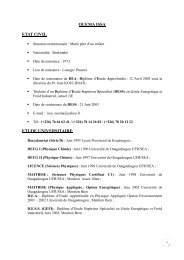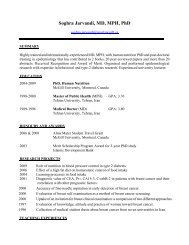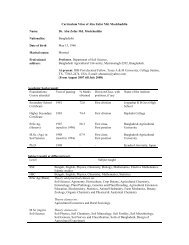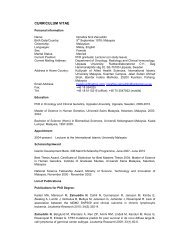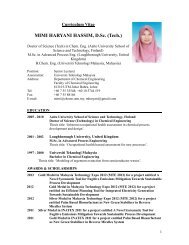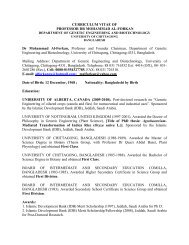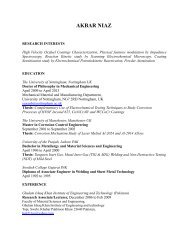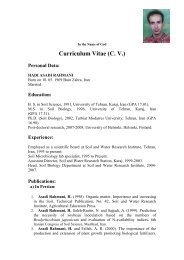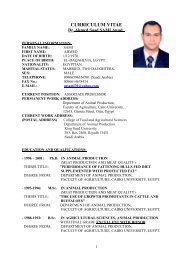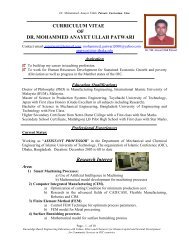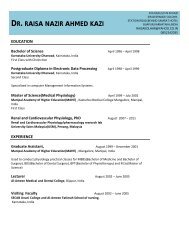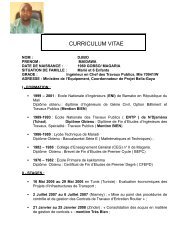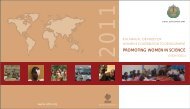Engineering: issues, challenges and opportunities for development ...
Engineering: issues, challenges and opportunities for development ...
Engineering: issues, challenges and opportunities for development ...
Create successful ePaper yourself
Turn your PDF publications into a flip-book with our unique Google optimized e-Paper software.
ENGINEERING: ISSUES CHALLENGES AND OPPORTUNITIES FOR DEVELOPMENTInvestments in engineering research <strong>and</strong> <strong>development</strong> havehistorically been low in Argentina as the priority was to fundthe sciences. In recent years, technological research has beenreceiving increasing support from the national government<strong>and</strong>, in smaller proportions, from the private sector. In 2003,the total investment in research <strong>and</strong> <strong>development</strong> was 0.5 percent of the GNP, in 2008 it will be 0.8 per cent <strong>and</strong> it is plannedto reach 1 per cent by 2010.Legally, Argentine engineering is controlled by institutionscalled ‘Professional Councils’ <strong>and</strong> ‘<strong>Engineering</strong> Colleges’ thatare governed by engineers <strong>and</strong> are located all over the country.They manage the professional registration, activities <strong>and</strong> ethicsof engineering on behalf of the State. Besides those institutions,engineers are freely organized in regional associations orengineers’ centres. Together, they constitute the national associationUADI, 106 which is member of UPADI, the Pan-Americanassociation, <strong>and</strong> WFEO. The missions of UADI <strong>and</strong> its centresare generally to represent engineers <strong>and</strong> to improve their professionalactivities <strong>for</strong> the service of their country. <strong>Engineering</strong>professional practice is regulated by codes of ethics, whichare approved <strong>and</strong> applied by the Professional Councils, <strong>and</strong>advised by Argentina’s National Academy of <strong>Engineering</strong>. 107CaribbeanGossett Oliver<strong>Engineering</strong> <strong>and</strong> its varied products, services <strong>and</strong> insights areinfluential in all walks of life <strong>and</strong> in all corners of the world asa major <strong>for</strong>ce directing our thoughts, actions <strong>and</strong> the courseof civilization. A country’s ability to cope with its many <strong>challenges</strong><strong>and</strong> to satisfy the dem<strong>and</strong>s of its citizens depend to alarge extent on the <strong>development</strong> <strong>and</strong> application of engineering,which has its grounding in the knowledge of science <strong>and</strong>technology.With very few exceptions, all developed nations are masters ofthe generation <strong>and</strong> use of science <strong>and</strong> technology (S&T), whileunderdeveloped nations have lesser capacity in the deploymentof these instruments. It can be argued that scientific<strong>and</strong> technological capabilities are the major <strong>for</strong>ces separatingdeveloped from developing countries <strong>and</strong> are, moreover, wideningthe gap between the rich <strong>and</strong> poor. A crucial step in closingthese <strong>development</strong> gaps in the Caribbean is the willingnessof the leaders to craft policies, strategies <strong>and</strong> plans to use engineeringinnovatively to tackle socio-economic problems <strong>and</strong>to protect their environment.Only two of the English speaking Caribbean isl<strong>and</strong>s (namelyJamaica <strong>and</strong> Trinidad <strong>and</strong> Tobago, with a total population ofabout six million) have had a long history in scientific awareness<strong>and</strong> application. They were among the earliest Caribbeanisl<strong>and</strong>s to craft laws to guide the use of science <strong>and</strong> technology<strong>for</strong> the exploitation of domestic natural resources. This isperhaps not surprising considering the fact that Jamaica wasamong the first in the American hemisphere to enjoy electricity,build a railway, establish botanical gardens as well as innovativelyapply research results to boost sugar cane production.Small countries like those in the Caribbean have a comparativelylimited number of professionals <strong>and</strong> material resources,yet they will have to face most, if not all, of the <strong>challenges</strong> oflarger, better equipped jurisdictions. This is <strong>for</strong>cing the Caribbeanpopulation to be more innovative in using the resourcesavailable in order to gain maximum efficiencies, <strong>and</strong> to remainflexible <strong>and</strong> adaptable to rapid change.The Caribbean’s management of science <strong>and</strong> technology hasto become adept at using few skilled <strong>and</strong> trained individualsin a very considered <strong>and</strong> focused manner to achieve beneficialresults. Decisions on what to tackle locally, what to acquirefrom the outside <strong>and</strong> how to marry the two are ineluctable<strong>and</strong> burning questions. Monitoring, evaluation <strong>and</strong> learningbecome essential in these endeavours.The Caribbean realizes that it has to use existing technology<strong>and</strong> engineering knowledge to tackle chronic productionproblems, while meticulously building a stronger research <strong>and</strong><strong>development</strong> base to seek answers <strong>and</strong> anticipate problems.The Caribbean there<strong>for</strong>e has to strengthen its knowledge surveillancecapabilities <strong>and</strong> partnership, creating systems to copewith its limited natural resources.Although the Caribbean has a strong university system <strong>and</strong>science pedigree, it has been difficult to translate domesticscientific results into technologies, products <strong>and</strong> servicesbecause of insufficient capital goods, funding, implementationmachinery, engineering <strong>and</strong> entrepreneurship capacities.The Caribbean’s private sector (perhaps with the exception ofTrinidad <strong>and</strong> Tobago) is not only small but largely conservativein its approach to <strong>development</strong>; it shies away from taking risksin technological investments while taking com<strong>for</strong>t in Governmentpapers, securities <strong>and</strong> retail trading. Many in the privatesector shun innovation <strong>and</strong> technological upgrading.Crime has become a major concern. The isl<strong>and</strong>s’ coastlines aredifficult to police without modern surveillance <strong>and</strong> detectiontechnologies to prevent the entry of contrab<strong>and</strong>, illicit drugs<strong>and</strong> weapons.106 UADI. Go to: http://www.uadi.org.ar107 National Academy of <strong>Engineering</strong>. Go to: http://www.acadning.org.arThe Caribbean essentially has all the main infrastructural S&Tcomponents, except <strong>for</strong> risk <strong>and</strong> venture capital funds <strong>for</strong> tech-244



